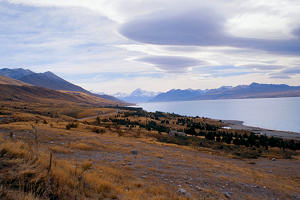
|
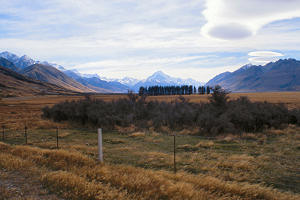
|
| Approaching Mt Cook |
|
Friday 8 April — Wanaka to Christchurch via Mt Cook
There was an extra girl around in the morning, she must have arrived while I was out last night. I consumed a pot of tea and a few crackers, did my chores, said farewell to the warden and set off in the direction of the bus station. A pretty dilapidated vehicle this morning to take us out to Tarras, me and a middle aged North American couple, to connect with the Queenstown to Christchurch bus.
The driver of that bus was a talkative chap, giving a running commentary as we went along. Stopped for morning tea at Omarama, I had a beer, then up to Mt Cook for lunch. On the way there, the driver said that it was possible to get off at Glentanner for a scenic flight and be picked up again when the bus came back. This seemed a good idea to me but when we got there, the planes were grounded due to high winds.

|

|
| Approaching Mt Cook |
|
At Mt Cook, the mountains were clear and I spent the break sitting in front of the hotel gazing at the snowy summits of Mt Cook and Mt Sefton. Juliet joined the bus for the trip up to Tekapo. The driver detoured round by the Tekapo B power station and along the canal bank to rejoin the main road half way to Tekapo.
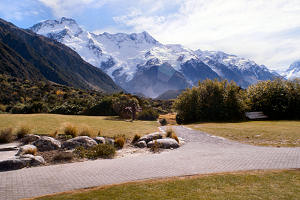
|
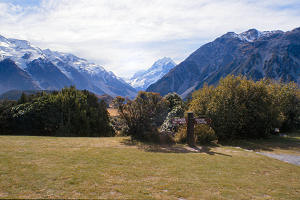
|
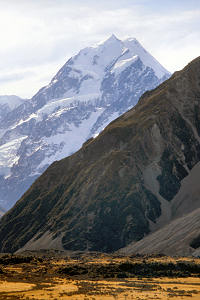
|
| Mt Sefton |
Mt Cook | |
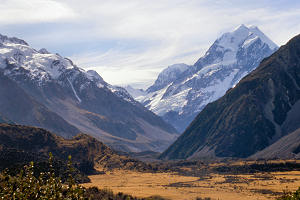
|
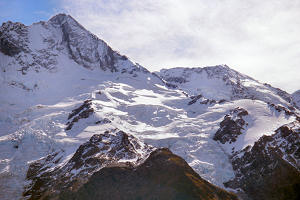
|
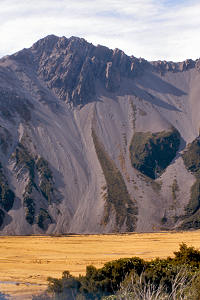
|
| Mt Cook |
Mt Sefton snow | No snow |
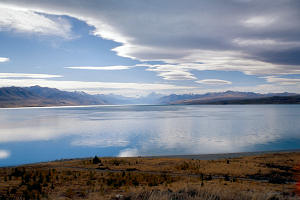
|
||
| Mt Cook beyond Lake Pukaki |
Then to Fairlie for afternoon tea. I tried to buy a map of the area but the good maps are available only at the council offices and it would have been cutting it a bit fine to get there and back. On to Christchurch fairly quickly, nothing much of note, I’ve been over that bit of road before in the car. The driver said that there are 79 million sheep in New Zealand of 18 different types and he had a booklet to prove it if anyone wanted to read it. Someone did.
I left my pack at the bus station and went for a wander. Stopped for a beer at the Old City Hotel, rather an attractive barmaid even before I started drinking. The local “character” came over for a chat and assured me that the pub was a friendly place, no-one was likely to stick a knife in me. I had a second jug on the strength of that.
While making my way in a leisurely manner, back in the general direction of the bus station, I lit upon a vegetarian restaurant and went in. Three choices of vegetarian dishes available, all with a selection of salads, for $7.50 each, or a bit of each with a larger selection of salads for $15. I chose the latter, redressing the lack of greens in my recent diet, and drank a pot of lapsang souchon. The restauranteur enquired whether I took milk in it!
Back at the bus station, I transferred my pack from the left luggage to the bus and climbed aboard. We left more or less on time, not many passengers.
Saturday 9 April — Christchurch to Wanganui
Stops at Cheviot, Kaikoura and Blenheim passed largely unnoticed. I dozed off occasionally and the journey passed reasonably quickly. There was a spatter of rain as we approached Picton where there were signs of recent heavy rain. It was still dark when we left on the Arahura but my hopes of seeing the sun rise on the Marlborough Sounds were dashed by heavy cloud.
Crossing the Cook Strait, some patches of blue sky appeared but the horizon was mirky. The sea was moderate but the wind was strong causing lots of whitecaps and patches where the blown spray was almost spectacular. There was a bit of drizzle as we approached Wellington.
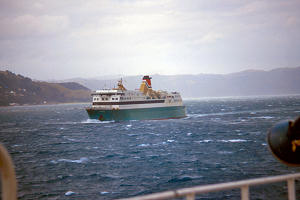
|
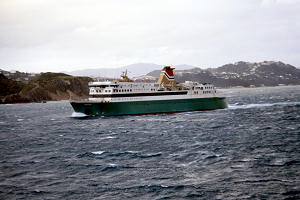
|
| Arahura outbound off Mirimar |
|
I don’t know why people should think that I’m an expert on local transport arrangements but several tourists asked me about the bus into town. When it arrived, half of them did not appear to catch it. I left my pack at the station, booked my next week’s travel and wandered around the city centre while waiting for the 1300 bus to Wanganui.
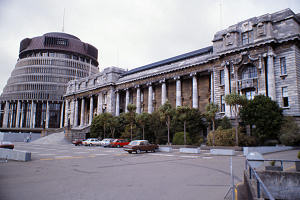
|
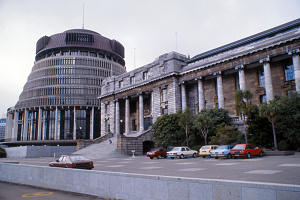
|
| The Beehive & Parliament Buildings |
|
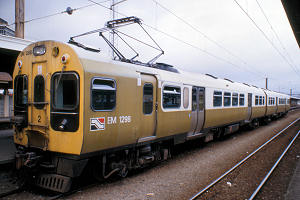
|
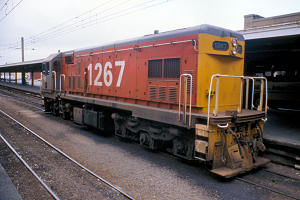
|
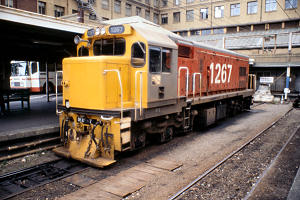
|
| Johnsonville EMU and shunter in Wellington Station
|
||
After an uneventful journey, I found the hostel and Bill Grey, the Aberdonian I had met in Alexandra. He had come across to the North Island just a few days before and was considering cutting short his time in New Zealand as he found the North Island boring in comparison to the South Island.
I went out in the rain for a beer or two. The locals were quite friendly and had no bother recognising my accent. Imagine a pub which does not sell matches! I’ll have to get some tomorrow. I hope the rain goes off, I suspect a wet Sunday morning in Wanganui might be worse than a wet Sunday in Kyle (which is not that bad now that the pubs are open).
Sunday 10 April — Wanganui to New Plymouth
Well, at least it was not raining in the morning. After a leisurely pot of tea with Bill and the temporary warden, Brionie, who was in Scotland for four weeks in 1979 (in October and it was cold), I left my pack in the common room and set out through the town to view the town from the top of Durie Hill.
This is stickie-oot lump just across the river from the town centre. There is a road up at the back but the frontal approach offers the choice of a steep path or a tunnel into the hill to a lift which ascends to the top. Unfortunately, the lift does not start functioning until one o’clock so I had to climb the path to the War Memorial at the top. The view would be good on a clear day but today the cloud was low and there was a fair haze giving the impression that it was still raining all around the town.
Views from Durie Hill.
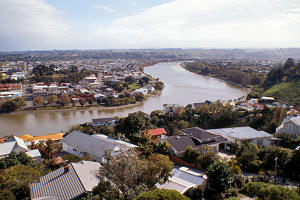
|
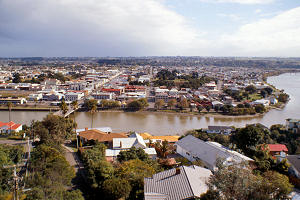
|
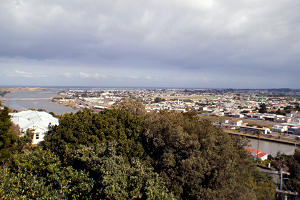
|
| Upstream |
Town centre | Downstream |
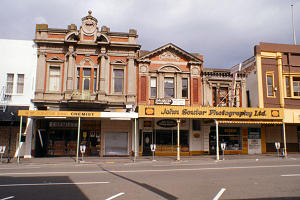
|
| On Wanganui main street |
Back down and wandered in the park around the museum/art gallery for a while before returning to the hostel to collect my pack and head for the bus station for the short trip to New Plymouth. The bus comes through from Wellington and has a lunch stop at Hawera, hardly worth while for me but probably welcome for those who have travelled all the way.
We were on time at New Plymouth but I got a bit confused when we were dropped at the train station (no passenger services now) rather than the bus station. Once I had re-oriented myself, I had no bother finding my way to the YH, just before five and not yet open. At ten past, a girl turned up and complained that the warden had closed up very sharp at ten o’clock and had no right to be late re-opening. She went off to check the back door and found it open so we all got inside. The warden appeared at twenty past with no word of explanation or apology.
Anyway, I went out for provisions and down into the town for a takeaway as the dairy didn’t have the milk in yet. I got the milk on the way back and frittered away the evening reading the paper and gassing in a desultory manner with assorted Canadians and Irishmen, finally getting this written.
I gave some thought to the matter of postcards, of which I haven’t written many, even though I bought a batch in Wanaka. Mind you, I still have seven left from those I bought in Hokitika early in February and Queenstown at the end of February. I ought to buy some North Island ones sometime, after I write some more of those I have. Perhaps I’ll write some now.
Monday 11 April — New Plymouth to Rotorua
And I did. So, breakfast in the morning, then walked down into the town and dumped my pack at the train station and went for a wander. I noticed a barber shop at the back of a tobacconist and decided that, since I had failed to get a hair cut in Dunedin, perhaps I should now. When finished, the barber needed a piece of paper to add the cost of the haircut, beard trim and GST and it all came to $15.35. I gave him the $15 and was dredging my pocket for the small change when he said that would do. Still almost twice the cost of an Invercargill cut.
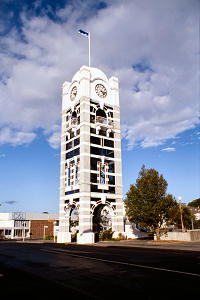
|
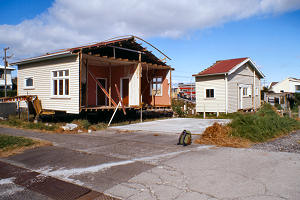
|
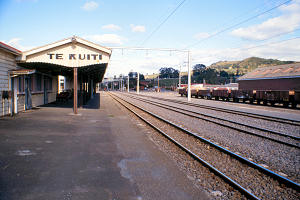
|
| New Plymouth clock tower |
Half a house in New Plymouth | Te Kuiti Railway Station |
The bus left more or less on time and was five minutes early at Hamilton after a five minute stop at Awakino and twenty minutes at Te Kuiti. A different bus for Rotorua, left on time and with no stops en route, we arrived ten minutes early, with the last of the daylight and, I think, the last of the silencer. It had been deteriorating steadily as we went along and was making a fair racket by the time we arrived.
Round to the hostel, a different one from my last visit. The site of the old one, which was fairly new in 1979, is now a fast food restaurant and the hostel is now in a converted hotel, which is larger but not an improvement on what I remember. The office was closed for tea so I had to hang around a bit before booking in.
After dumping my gear, I went into town for a fish supper, cooked in healthy oil rather than fat, and pretty tasteless, had a couple of beers, a look at the dark and steaming lake, and back to the hostel. Pretty boring. The plumbing here is erratic. Roll on tomorrow’s bus.
Tuesday 12 April — Rotorua to Te Araroa
And in due time it did. A fine morning, clear and sunny. The bus left more or less on time, with a whine, which seems to be the door alarm and is meant to stop when the door is closed. At every stop, mostly for parcels, the driver tried to silence the whine but on the only occasion he succeeded, the door was actually open and when he closed it, the whine restarted.
When we got to Kawerau, the passengers for beyond Whakatane were transferred to another bus which had followed us, empty, from Rotorua. The two buses proceeded in convoy as far as Whakatane but we did not go in to the town so I don’t know what happened to any passengers who might have wanted to go from Whakatane to Opotiki.
Anyway, I got there so that was OK. Across from the bus station was the Shamrock Cafe but with two hours to kill before the connection to Te Araroa, I went for a walk up the main (only) street, had a jug in the Royal Hotel, walked back down the main street and decided to nip in to the Opotiki Hotel for a quick one.
The barman had worked and played rugby in Montrose for two years and refused any money. He also gave me an Opotiki Hotel, Bledisloe Cup Tour, souvenir pen. When he went off, I bought another pint. Next I went to the bank for some cash. The teller was a young English lad who had once spent three weeks in Glasgow on a school exchange from Devon.
While in the Opotiki Hotel, I was offered an afternoon’s jetboating, a bed for the night and a lift to Auckland in the morning. Sometimes I think it is a pity that I spend so much time working out an itinerary and then stick to it.
The next bus was more of a local service than the others I have travelled on. It left ten minutes late after everyone got sorted out with no sense of urgency at all. Most of the passengers had come in to town on the morning bus, apparently for a day’s shopping, and were much burdened with packages. I had to explain who I was and what I was doing several times.
I kept waiting for the driver to announce a comfort stop, especially when we arrived at Te Kaha twenty minutes before the scheduled time, but he pressed on. Then I realised that other passengers were nipping off the bus into nearby houses whenever we stopped. In the end I had to go up and ask if he would stop at some convenient toilet. Which he did a few minutes later, when myself and another passenger scuttled quickly through a tearoom. It is not a good idea to drink between buses. I have told myself so, often. I don’t know why I don’t pay more attention to what I say.
Onward then, seeming to make slower progress now, probably because the driver kept slowing and stopping to point out the consequences of Cyclone Bola, and it was five minutes after the scheduled time of arrival at Te Araroa before we came over the last hill. It was starting to cloud over with a mist of rain off the sea. and it would soon be dark. So, when the bus pulled in to the holiday camp several miles before the town, the largest source of cheap accommodation in the area, I took the driver’s advice and got off.
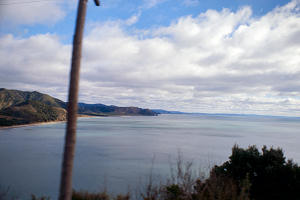
|
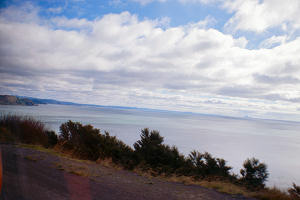
|
| A couple of shots from the bus |
|
The bunkhouse was full but I got a cabin to myself for $15. It turned out to be a section of a terrace, sliding glass partition at the front, curtained sleeping alcove at the back, sink with cold water tap, small cooker with oven and grill, a couple of pots, frying pan, electric kettle and toaster, a selection of cutlery and crockery, some general cleaning equipment, a table and three chairs, and no fewer than five bunks. As there was no bedding, I had to delve deep in my pack to find my sleeping bag. It may be bulky but it’s just as well I brought it.
As I got off the bus, the driver said that I should be at the roadside at 0815 in the morning, which is a good bit earlier than I had expected, though, on reflection, I suppose the 0840 in the timetable is the time from Te Araroa which may be some miles distant. It will be necessary to get up early as the sleeping bag has to go back in the bottom of the pack.
I think I’ve lost my tobacco knife, I can’t find it and I fear it has slipped un-noticed from the pocket of my shorts, following in the tracks of assorted coins which have gone astray, sometimes un-recoverably, while sitting down on park benches, bus seats etc. I am bereft, I will have to scour the shops in Gisborne tomorrow for a replacement.
Anyway, here I am, comfortably ensconced, miles from the nearest pub on a dark and damp night and it’s only half past seven. There is a TV room but I’m not reduced to that, yet. I suppose I’ll have a shower and an early night, or even tidy my day pack and clear out all the sweetie papers.
Wednesday 13 April — Te Araroa to Gisborne
By the time I’d tidied the day pack etc. it was half past ten before I went to bed. The mosquitos were a bit of a nuisance, my imagination sees many more than there are and I keep listening for more. Still, I slept well. I’d set my watch alarm for seven but I woke before then which was just as well as it was barely audible with my arm inside the sleeping bag.
A pot of tea, a few crackers, stuff the gear back in the pack it takes more room now that it has all been disturbed, and out at the roadside by ten past eight, where there were some youngsters, obviously waiting for the school bus. A German cyclist appeared from the camp, he had been advised to use the bus from here to Gisborne owing to the state of the roads, which had not been too bad coming from Opotiki, just some slips on the hillsides in the last few miles, but apparently it is much worse further on.
A bus arrived at half past eight, with Gisborne on the front, and looking a bit muddy. The driver got out to attend to our luggage and the kids piled in, obviously this is the school bus as well. When we got aboard, the bus seemed full but there were two empty seats at the front. A bit further down the road, another adult came aboard and suddenly, there was another empty seat. At Te Araroa, the kids poured out. I don’t know how many there were as I didn’t think to count, but I didn’t know you could get so many people on a bus. They seemed never-ending and yet there had been very little noise on the journey.
Anyway, they got off and we went on, over hill and down dale. The road was indeed in an interesting condition. Still some mud on the road where natural drainage patterns had not been re-established, numerous slips which had taken lumps out of the road. At one point, I wondered why the driver was so far over to the right, I could see nothing wrong with the road looking down at the side, until I realised that there was a fault line running along the road and the bit that I could see was about a foot lower than the bit the bus was on.
And the silt, lots of silt, all over the flat land by the rivers, with driftwood scattered everywhere. The worst was coming down the Uawa River with thick silt on the land a good thirty feet above the river. The whole valley must have been flooded to a considerable depth. This was the first place I’d seen desolate damp houses sitting amidst a sea of silt, and orchards growing in a sea of silt. What a lot of silt.
Still, the bus got through with just a couple of brief delays where earth-moving equipment was moving earth, recreating ditches or stabilizing bankings. Silt everywhere. The last few miles along the coast into Gisborne, being mud-free, seemed a different world.
At Gisborne, I left the pack at the luggage office, had lunch in a pub and went for a walk up the Kaiti Hill, from where there is a good view over the town and, in clear weather, which today wasn’t, to the distant hills. There was no problem getting a bed at the hostel, they have been very quiet since the cyclone. After a shower, I wandered back into the town, tempted by a menu offering crayfish that I had noticed earlier in a restaurant doorway, but the restaurant was not open, even at seven o’clock, so I had fish and chips instead. Back to the quietest hostel I’ve been in, nine people sitting around in silence.
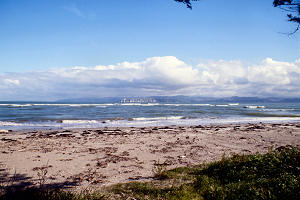
|
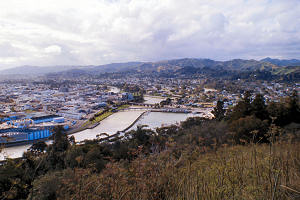
|
| Young Nick’s Head |
Gisborne from Kaiti Hill |
Thursday 14 April — Gisborne to Tauranga
Yes, I did get a tobacco knife yesterday, pretty cheap, it must have been very old stock. Time for a leisurely breakfast this morning, did my chores and headed down for the bus. Off on time, up the Waipaoa River valley. More signs of flooding, with silt covered fields, slips on the hills and mud on the road. It really was depressing, but not for long, as things improved greatly as we went over the top just before a brief stop at Matawai, nicely timed for the toilet.
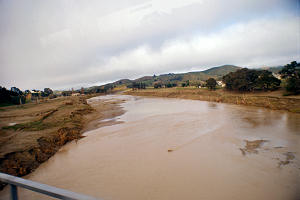
|
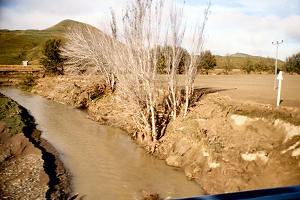
|
| Silt in the Waipaoa River valley |
|
There was some sign of flooding just above the Waioeka Gorge, but nothing like on the other side. Nice run through the gorge to Opotiki where I expected to change buses. However, the drivers advised me to stick with the bus I was on for the scenic route to Whakatane, where I would get a connection direct to Tauranga, rather than having a two hour wait at Rotorua.
While I was loitering at Opotiki, a bus passed and the driver waved to me. It was the lad who drove the bus to Te Araroa on Tuesday. I followed him round to the garage and enquired after my tobacco knife. No, he hadn’t seen it but this was the very bus and I was welcome to have a look myself. Alas, it wasn’t there, which was a pity as it would have made an excellent ending to the story.
On arrival at Tauranga, I considered my options. Tomorrow is the last day on my Travelpass and I wanted to end up in Auckland. Now, I could get an overnight bus to Wellington and catch the Silver Fern back north, or I could stay in Tauranga and just get the bus to Auckland in the morning. Well, I was not sufficiently impressed with the Silver Fern last time to justify an overnight journey to catch it, and the beer was very expensive, so I went for a look at the new bridge to Mt Maunganui before wandering along to the hostel.
I sat outside and smoked my pipe while waiting for the office to open at five, then booked in, had a pot of tea, conversed with a lass from Kildare, went for a walk into town, ate fish and chips, drank a pint of beer, dodged a shower of rain, returned to the hostel and went to bed.
Friday 15 April — Tauranga to Auckland
In the morning it was raining depressingly, so I pottered around in an even more leisurely manner than usual just putting off the moment when I had to go out. At last, even I was bored so I shouldered my pack, lit my pipe, put up my umbrella and headed into town. Reached the bus station by an indirect route and sat around, watching the comings and goings while waiting for the bus.
The Irish lass, now known as Nuala Walshe (with the “e”), turned up too. In view of the weather, and the forecast suggested that another cyclone, “Diva” this time, was heading towards the North Island, she had decided to head for Auckland rather than Coromandel. So we sat and chatted through the journey.
Nuala had an address in Auckland but she had left it in her rucksack which was in the boot of the bus, so it was not until we arrived at the Railway Station that I was able to advise her that she could have got off twenty-five minutes earlier. I suggested that she take the suburban train back and off she went.
I realised that I had left my new tobacco knife at Tauranga, on the seat outside the bus station.
I went to the Australian Rail desk and paid for and collected my Australian train tickets, then went downtown and looked at travelling packs before taking the train out to Sturges Road and making my way to Al’s. Owing to the garbling of my brief message to Al, Claudia had been looking for me at the railway station at 4.15pm, when I had not arrived. Indeed, no-one had arrived.
I just sat around for the evening, jawing and being fed and watered.
[ next chapter ]
John Reynolds — March 2013